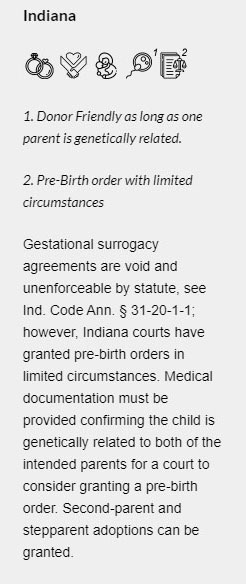Is Surrogacy Legal in Indiana?
Surrogacy Law in Indiana
Indiana Surrogacy Law: Types of Surrogacy
In Indiana, gestational surrogacy is not prohibited but contracts are rendered “void and unenforceable” by Indiana Code §31-20-1-1 (p.421) Despite that, gestational surrogacy does occasionally take place in Indiana, and courts have issued pre-birth parentage orders to intended parents.
Traditional (genetic) surrogacy in Indiana is similarly difficult to accomplish due to the same statute. Courts will not grant pre-birth orders for intended parents choosing to pursue this route; instead, they must complete a post-birth adoption to be legally declared a child’s parents.
Are There Surrogate Requirements in Indiana?
No specific legal requirements exist to serve as a gestational surrogate in the state of Indiana.
Does Indiana Surrogacy Law Allow for Pre-Birth Orders?
Parentage Orders: Courts in Indiana generally do not grant pre-birth orders of parentage; those that do, limit the ability of practitioners to grant such orders for intended parents who are not 100% related to the resulting child.

For pre-birth orders, the conditions under which intended parents can be declared legal parents if at least one parent is genetically related to the child are listed below:
Yes
- Married heterosexual couples, using their own egg and own sperm*
- Unmarried heterosexual couples, using their own egg and own sperm*
- Married heterosexual couples, using an egg or sperm donor**
- Unmarried heterosexual couple using an egg or sperm donor**
- Single parent using own egg or sperm***
No
Married same sex couples
Unmarried same sex couples
* Must provide documentation of their genetic connection to the embryo
** The agreement must have been created pursuant to the laws of. State that declares the legal rights of all parties
*** At the discretion of the Judge
For pre-birth orders, the conditions under which intended parents can be declared legal parents if neither parent is genetically related to the child are listed below:
Yes
N/A
No
- Married heterosexual couples*
- Unmarried heterosexual couples*
- Married same sex couples*
- Unmarried same sex couples*
- Single parent*
* Intended parents who are in no way related to the resulting child, may still be able to be declared legal parents of a child—if they’ve developed a surrogacy agreement in a state that respects the legal rights of the involved parties. Judges can choose to uphold these contracts if they wish, but results vary widely.
Whose names go on the birth certificate in Indiana?
Intended parents should be, as of April 2016, listed with the designation “parent and parent.” Administrative execution of this rule, as of that date, hadn’t yet been consistently implemented.
International same-sex couples can most likely receive a birth certificate that names the biologically related parent and the gestational carrier as parents but is not guaranteed. To amend it, the non-biological parent will have to obtain a second parent adoption, in Indiana or elsewhere. They cannot receive a legal parental designation solely based on the child being born in Indiana.
Egg Donation Law
Case law in this area has yielded inconsistent results. Sometimes, parental rights are granted to the intended parents, but other times they’ve been granted to the donor.


